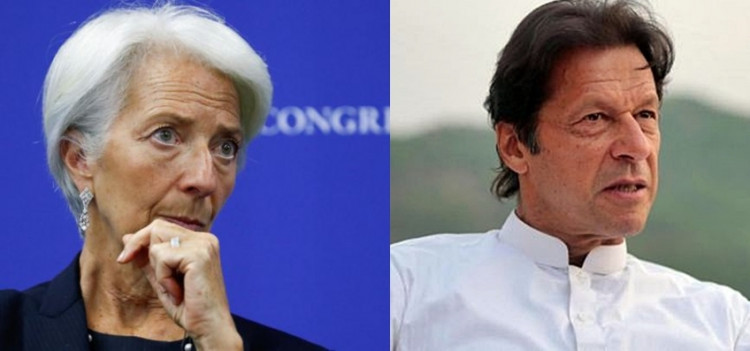The International Monetary Fund (IMF) confirmed today it will send a team to Pakistan in the coming weeks following a formal request for emergency bailout loans made by the government of Prime Minister Imran Khan.
IMF Managing Director Christine Lagarde made the announcement after meeting with Pakistani Finance Minister Asad Umar and Central Bank Governor Tarik Bajwa. All three met at the sidelines of the ongoing 2018 Annual Meetings of the International Monetary Fund and World Bank Group at Bali Nusa Dua, Indonesia.
Lagarde said the Pakistani leaders requested financial assistance from the IMF to help address Pakistan's economic challenges. She said an IMF team will visit Islamabad in November to initiate discussions for a possible IMF-supported economic program. We look forward to our continuing partnership with Pakistan, she said.
If agreed to, the bailout package will be Pakistan's 13th IMF bailout since 1988. The fund most recently lent Islamabad $6.7 billion in 2013. Any loan deal with the IMF will involve the restructuring of some of Pakistan's huge foreign debt, which might lead to austerity measures being imposed.
Economists acknowledge Pakistan's budget deficit, which rose to 6.6 percent of GDP in 2017, is unsustainable.
The announcement followed the biggest single-day loss incurred by the Karachi Stock Exchange, Pakistan's stock market, in a decade. The market plunged by over 1,300 points on Oct. 8, losing almost US$2.6 billion (Rs 270 billion) of its capitalization in a single day.
Earlier this week, Khan confirmed mounting speculation he would seek some $12 billion in assistance from the IMF and "friendly nations" such as China and Saudi Arabia to cope with his country's rapidly growing balance of payments crisis.
Khan's announcement, however, provoked outraged opposition lawmakers in Islamabad in staging a noisy sit-in outside the parliament building on Oct. 11 to protest the decision.
The Pakistani rupee plunged by seven percent earlier this week after the loan request was made public. The 26 percent drop in the rupee's value since 2017 has caused prices of basic goods to again rise, angering the already beleaguered Pakistani populace.
China and Saudi Arabia are already heavily financially involved in transportation and energy projects in Pakistan that are part of China's One Belt One Road initiative (OBOR). Pakistan is is one of the biggest borrowers in OBOR.
China intends to spend more than $60 billion in loans and investments to build a transportation network from western China through Pakistan to the Indian Ocean. On the other hand, Pakistan refuses to reveal details about the loans it has received from China.
The United States has criticized China's infrastructure lending, warning it has saddled some developing countries with debts that they cannot afford to repay. The U.S. is the IMF's largest source of donor funds.
Lagarde said that in considering new loans for Pakistan, the IMF will "need to have a complete understanding and absolute transparency about the nature, size, and terms of the debt that is bearing on a particular country."
When he took office a few months ago, Khan vowed to curb borrowing because of the heavy borrowing by the previous government. But he now notes that Pakistan has barely enough foreign exchange reserves to pay its debts. This looming financial crunch has forced him to seek further assistance.
State Minister for Revenue Muhammad Hammad Azhar admitted Pakistan has "extremely high deficits." The burden will mount unless we restructure the debt, he said.





